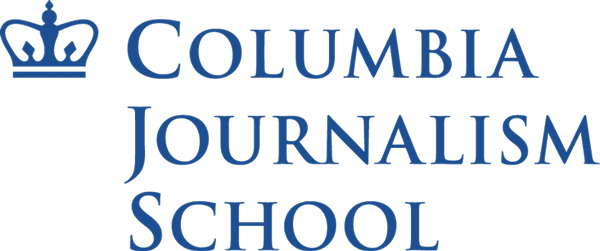When Patrick Lynch stepped up to the podium at the Staten Island GOP “Triumph Rally” earlier this month, he gazed at the nearly all-white crowd, clad in MAGA hats and waving Trump flags, and deemed it “a picture of what America is.”
Lynch, president of the NYC Police Benevolent Association, spoke to a crowd of about 1,000 with a sermon-like rhythm, railing against “mutt” cop-killers, Black Lives Matter protesters, “a Communist city hall,” “a Socialist city council,” and university professors who teach students to criticize the system rather than salute the flag. High above the crowd was a larger-than-life image of Donald Trump, photoshopped onto a bulging muscular torso, serving as a backdrop to the stage.
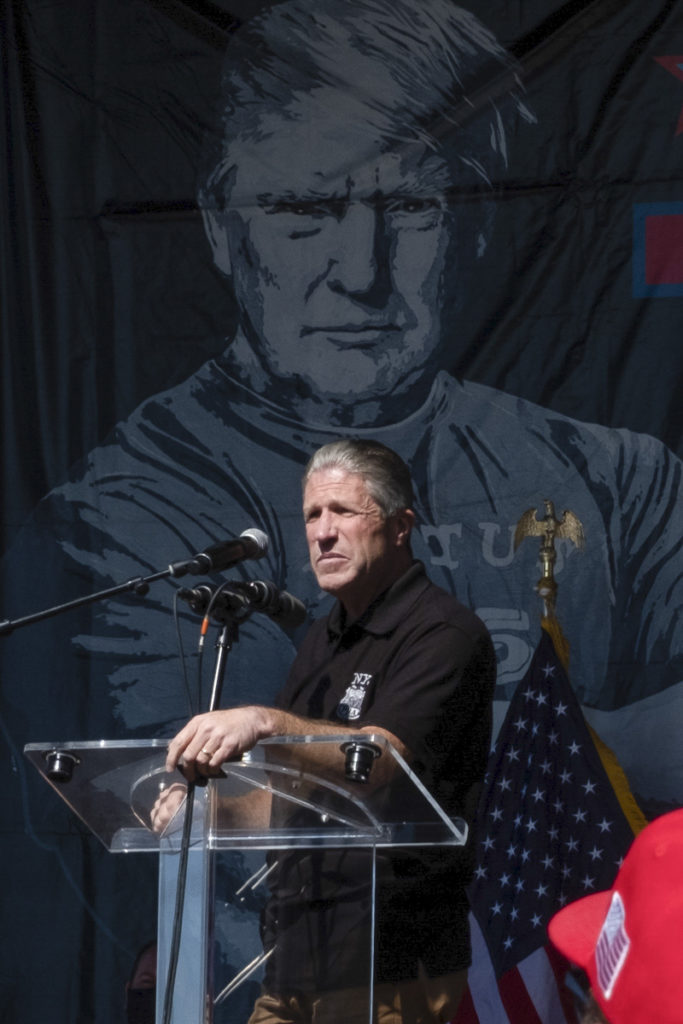
Party rally on Oct. 3. (Photo/Dita Cavdarbasha)
Since leading the city’s police department into a presidential election with an unprecedented endorsement of Donald Trump, Lynch has been appearing at various GOP events, painting a picture of chaos and impending societal collapse under Democratic Party rule. Critics respond that his full-throttle support for an authoritarian president undermines trust at a pivotal moment in community-police relations.
“Why would you look to endorse someone that has, probably in the last 50 years, been the most polarizing president that we’ve ever had in this country?” said former Second Vice President of the P.B.A., Mubarak Abdul-Jabbar, who retired in November 2018. “It’s just mind boggling.”
Detective Felicia Richards, president of the Guardians Association of the NYPD, which represents Black police officers, said that Lynch did not consult rank-and-file officers before making the presidential endorsement. “It was almost like it was a bully move,” she said. In a statement denouncing the endorsement, the Guardians said it “undermines every police officer’s ability to remain neutral and nonpartisan in the eyes of the public.”
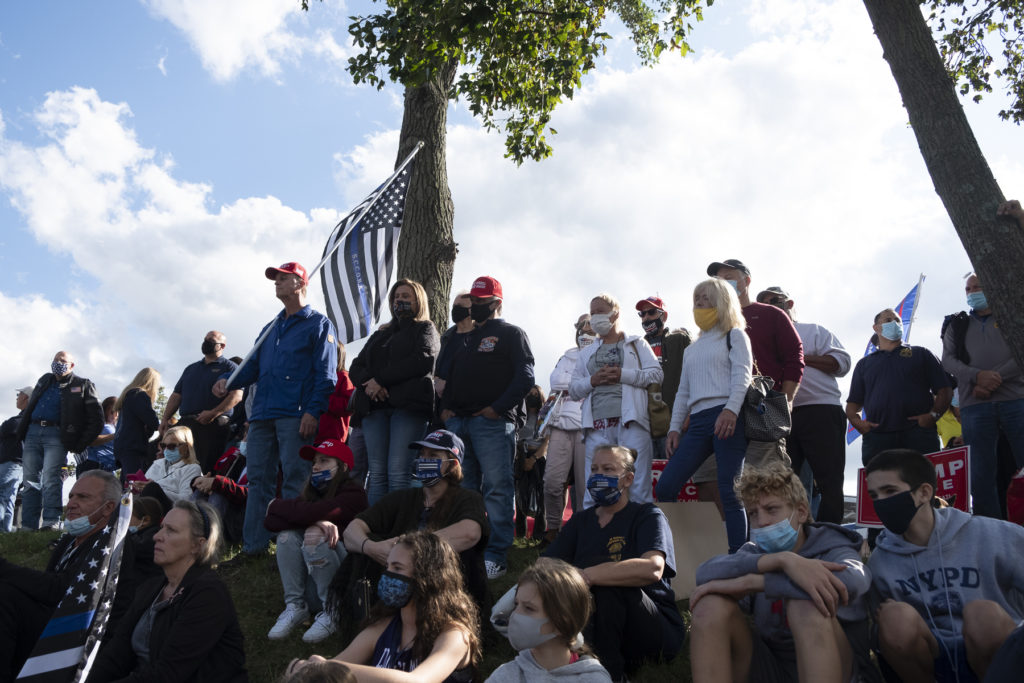
This was not Lynch’s first foray into right-wing national politics on behalf of the his members.
In 2016, Lynch gave controversial Milwaukee County Sheriff David A. Clarke Jr. the NYCPBA Person of the Year Award, an honor normally granted to a prominent New Yorker. Clarke, a devoted Trump supporter, called Black Lives Matter members subhuman creeps. He resigned as sheriff in 2017 following lawsuits, and joined the pro-Trump super PAC, America First Action.
Last year, the P.B.A. spent more than $76,000 to undermine Mayor Bill de Blasio’s presidential bid. Lynch cited stalled contract negotiations regarding officer pay increases as the reason for opposing de Blasio’s campaign.
The P.B.A. did not respond to three calls and two emailed requests for comment.
As a union, the P.B.A. is responsible for collective bargaining on behalf of its 24,000 members with the rank of Police Officer. Lynch has spent over two decades as its president, advocating for wage increases, improving health benefits for active and retired officers, and defending officers like Daniel Pantaleo, who used a prohibited chokehold that killed Eric Gardner in 2014. In June 2020, Gov. Andrew Cuomo signed a package of police reform bills, despite objections from the P.B.A.
As a whole, the NYPD comprises around 36,000 officers. While the senior leadership of the P.B.A. is overwhelmingly male and white, the NYPD is itself 53% Black, Hispanic, and Asian, and serves a city that looks and votes very differently from the P.B.A.’s leadership. In 2016, 78% of New York City residents voted for Hillary Clinton.
Anthony Miranda, a retired NYPD sergeant and chairman of the National Latino Officers Association, which supports Biden, said the P.B.A. endorsement is a step backwards. “We were beginning to change the habits of the police department in terms of discrimination not only against officers of color but against our communities at large, and I think we’ve now lost all the advancement that we had.”
He added, “If Trump wins then we are going to go back … think of the images of the civil rights movement when you had officers with dogs, water cannons.”
Leslie Ramos, executive director of the 82nd Street Partnership, a business improvement district in the largely immigrant community of Jackson Heights, Queens, said that the endorsement casts doubt on other officers. The P.B.A. “leadership doesn’t represent the values of most cops I have spoken to,” adding that the “hateful rhetoric and pro-Trump stand only serve to increase distrust and dislike of the NYPD.”
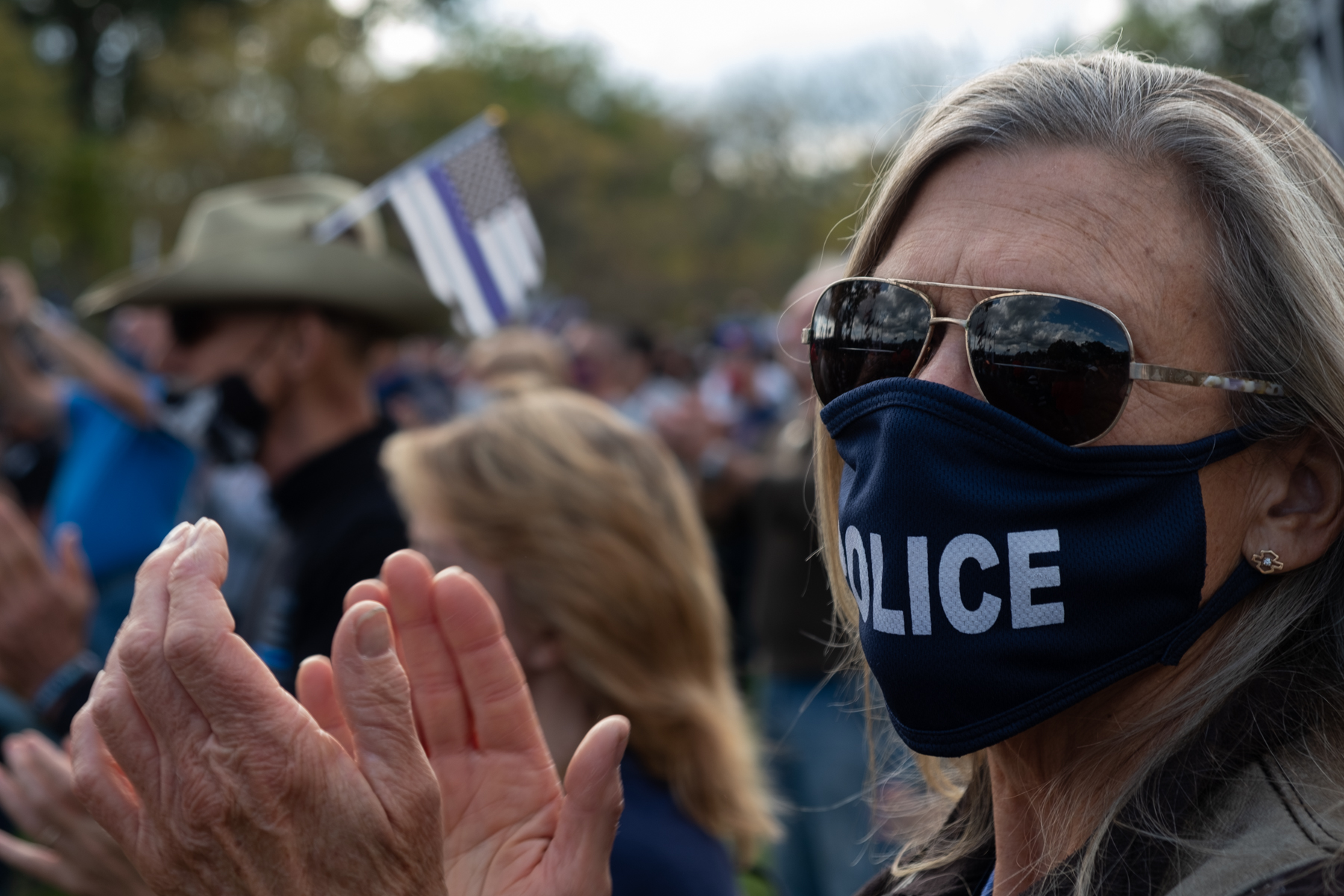
Many officers, both favoring and opposed to the endorsement, were unwilling to go on record about their political preferences. FEC campaign filings show that of those active-duty NYPD officers who made donations in the 2020 national campaign, 65% supported Republican national candidates and 35% supported Democrats.
Lynch’s intentions to support Trump were clear as early as July 31 when he visited the White House, along with other members of the National Association of Police Organizations.
Sitting across from Trump and Vice President Mike Pence, Lynch painted a picture of New York City in chaos, with violence surging out of control and crime rates returning to those seen during the David Dinkins mayoral era. He blamed city and state Democrats for police reforms, such as laws that ban chokeholds and open police misconduct records.
Lynch said to Trump, “They can charge us criminally. Yes, sir. It’s disgraceful. It’s like they reversed the world. It’s the upside-down world right now. And I have 36 years in the job. I’ve never seen it this bad, sir.”
Two weeks later, Lynch was with Trump again, this time at the President’s golf club in Bedminster, N.J. along with former Mayor Rudy Guiliani. He was accompanied by dozens of NYPD officers in red Trump hats who chanted “build that wall” and “four more years” as Trump ridiculed his political opponents.
Lynch again painted a grim picture of New York City, claiming incorrectly that shooting incidents now rival 1993 levels. The city averaged about 350 shooting incidents per month in 1993. At the time of Lynch’s claim, the city averaged 127 per month in 2020, inclusive of the summer’s marked increase in incidents.
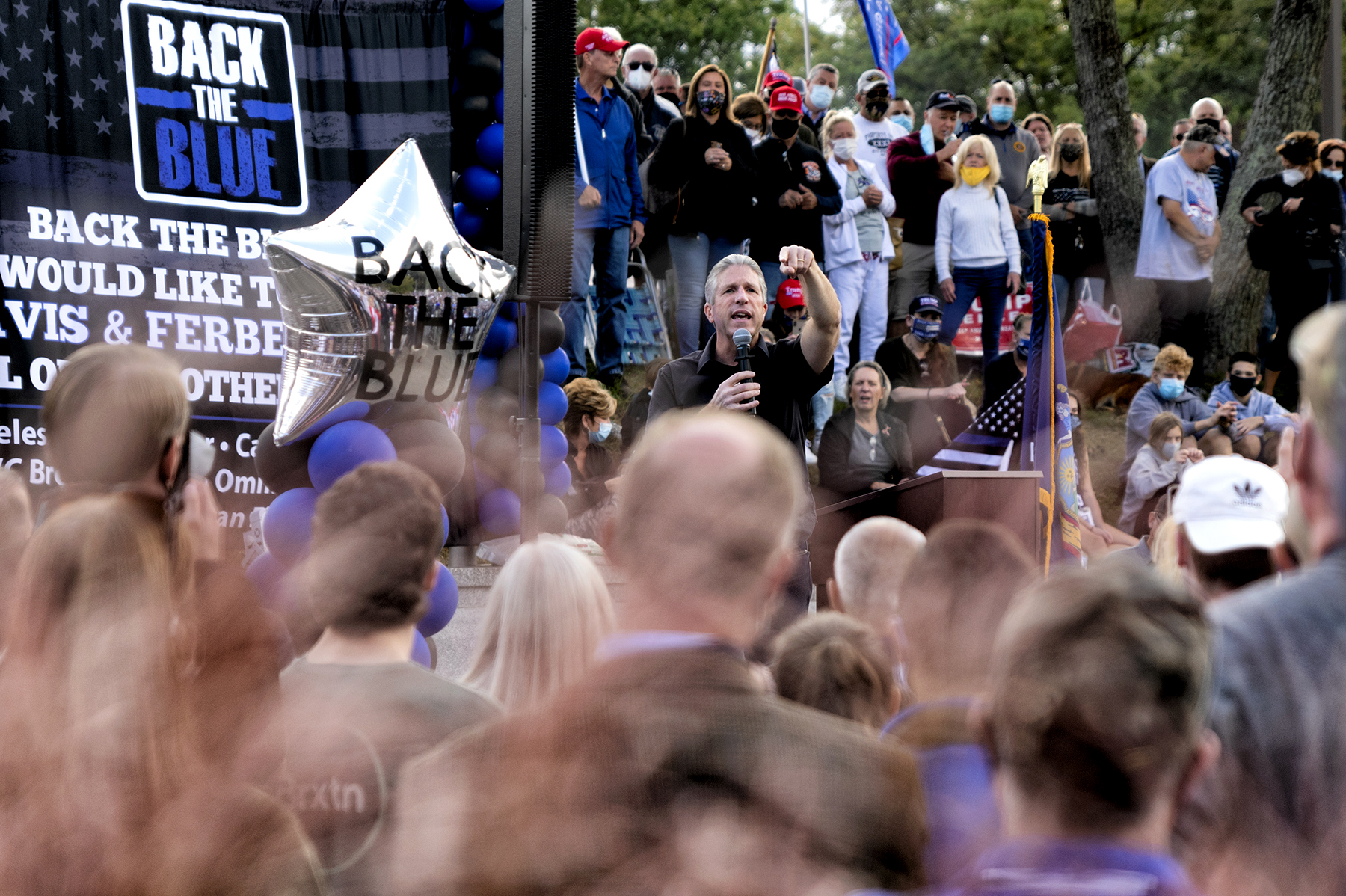
Lynch’s appearances have been accompanied by showmanship and practiced political rhetoric, skills honed over the past 30 years.
Lynch was born in Queens to Irish-American immigrants and began his career as an officer at the 90th Precinct in Brooklyn in 1984. There he produced a newsletter for officers, the Brooklyn North News, which highlighted the lack of communication between the rank-and-file and union executives. Lynch leveraged the audience from the newsletter and in 1999 won the P.B.A. presidency, the youngest person to hold the office. His combined salaries as a police officer and union leader now earn him more than $208,000 a year.
GOOD AND EVIL
The day after the Staten Island GOP rally, Lynch spoke to a gathering of Suffolk County officers and “Back the Blue” supporters. His rhetoric was focused on sweeping narratives of good and evil, right and wrong, family and flag and the radical left.
He was on stage in Hauppauge, Long Island, in a county where 51.5% of voters went for Trump in 2016. The audience was again white, mostly male, and sporting Blue Lives Matter patches and flags, sprinkled with some Proud Boys and QAnon branding.
Strutting from one end of the stage to the other, Lynch delivered another campaign-style address, noting that people out there are trying to “demonize that blue line.”
As he closed, Lynch made a final push. “We need President Trump in that office,” he said, adding that these “are the right folks, for the right spots, to help the right guy up in the White House.”
Contributing to this story: Kate Stockrahm, Joseph Clark, Sebastian Tuinder, Dita Cavdarbasha, Persis Rao, Victor Raison, Joyce Philippe, Madeline Renbarger and Nadia Batool Bokhari.
About the author(s)
Kate Stockrahm is a multimedia journalist based in New York City. Originally from Detroit, she received her bachelor’s degree in English with a Latin minor from the University of Michigan. She was an event and tourism director in Washington, D.C. before moving to Manhattan. Now, Kate focuses on audio and visual storytelling at the Columbia Journalism School, where she currently reports on the city's science, tech and culture scenes. Connect with Kate at k.stockrahm@columbia.edu.

